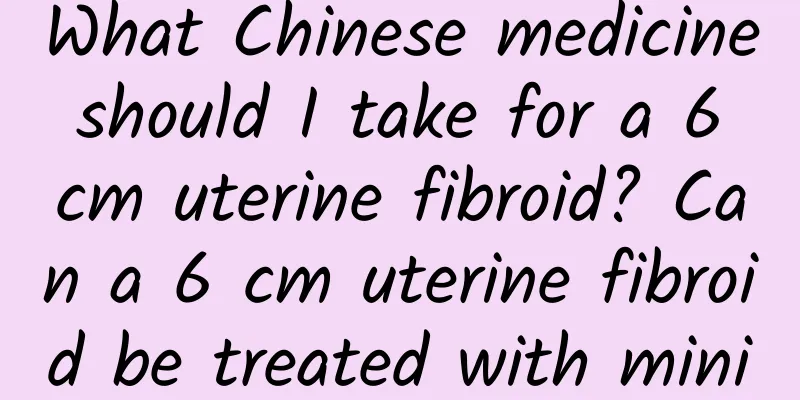What Chinese medicine should I take for a 6 cm uterine fibroid? Can a 6 cm uterine fibroid be treated with minimally invasive surgery?

|
What Chinese medicine should I take for a 6 cm uterine fibroid? This is a question often asked by many women with uterine fibroids. Uterine fibroids are one of the most common benign tumors in women and generally do not require treatment, but for a 6 cm uterine fibroid, some symptoms may begin to appear, so some Chinese medicines can help relieve these symptoms. 1. Angelica: Angelica is a herb commonly used in traditional Chinese medicine to regulate the female reproductive system. It has the effect of promoting blood circulation and removing blood stasis, and can relieve the pain symptoms caused by uterine fibroids. Angelica can also help regulate women's menstrual cycle and relieve irregular menstruation. 2. Chuanxiong: Chuanxiong is a traditional Chinese medicine with anti-inflammatory and anti-thrombotic effects. It can improve uterine blood circulation and relieve pain symptoms caused by blood stasis. At the same time, Chuanxiong can also help regulate the function of the endometrium and relieve menorrhagia caused by uterine fibroids. 3. Scutellaria baicalensis: Scutellaria baicalensis has the function of clearing away heat and detoxifying, and can help clear the inflammation around uterine fibroids. Scutellaria baicalensis can also improve the symptoms of dampness and heat in the body, and is particularly effective for patients with fibroids accompanied by abdominal distension, short and dark urine, and other symptoms. While taking Chinese medicine, patients are advised to maintain good living habits. A proper diet, attention to rest, and avoidance of excessive fatigue are all important factors in maintaining uterine health. However, for uterine fibroids as small as 6 cm, relying solely on Chinese medicine may not completely solve the problem. In some cases, minimally invasive surgery may be a necessary option. Minimally invasive surgery usually uses laparoscopic technology to enter the abdominal cavity through a small incision to remove uterine fibroids. Compared with traditional open surgery, minimally invasive surgery is less traumatic and has a faster recovery. For some young women, choosing minimally invasive surgery is beneficial to preserving uterine function. However, whether surgery is necessary depends on the specific situation. If uterine fibroids do not cause obvious symptoms, the doctor may recommend observation and regular checkups. However, if severe symptoms such as abnormal bleeding, pain, and urethral compression occur, surgery may be necessary. For uterine fibroids of 6 cm in size, symptoms can be relieved by drinking some Chinese medicine that has the effects of promoting blood circulation, removing blood stasis, reducing inflammation, clearing away heat and detoxifying. However, in some cases, minimally invasive surgery may be a necessary choice. Therefore, it is recommended that patients must listen to the doctor's advice when facing treatment options and make reasonable decisions based on their own circumstances. Only by combining traditional Chinese medicine and modern medical means can uterine fibroids be better treated and women's health be restored. |
Recommend
Office workers who have picky eating habits are prone to edema! Nutritionist Chen Yijuan: 3 types of water-draining diets to fight edema-type obesity
Are you also suffering from edema? Office workers...
What to do if hydatidiform mole is malignant
What should I do if hydatidiform mole is malignan...
Can I get pregnant if I have abnormal leucorrhea?
Abnormal vaginal discharge does not necessarily a...
Experts explain what are the main causes of cervical hypertrophy
Cervical hypertrophy is a common gynecological di...
Recommended authoritative hospital for the treatment of bacterial vaginosis
We should all be familiar with gynecological infl...
I get leg cramps in the middle of the night. Is calcium supplementation effective?
Pregnant women are prone to sudden leg cramps whi...
Treatment of Pelvic Inflammatory Disease with Chinese Medicine Characteristics
Treatment of Pelvic Inflammatory Disease with Chi...
What are the hazards of cervicitis in women? Women should be careful of the four major hazards of cervicitis
The occurrence of cervicitis can have a very big ...
Hematogenous spread usually causes adnexitis
Hematogenous transmission usually causes adnexiti...
How much does it cost to abort a cornual pregnancy?
How much does it cost to have an abortion for cor...
Why is cervical erosion becoming more common in young women? Four reasons why young women suffer from cervical erosion
In life, the threshold for cervical erosion is ge...
Revealed: The hazards of four common acute pelvic inflammatory diseases
Acute pelvic inflammatory disease is a gynecologi...
What are the causes of congenital absence of vagina?
In our daily life, many female friends are troubl...
Symptoms of chocolate cysts
Symptoms of chocolate cyst: 1. Pain during sexual...
How much does it usually cost to treat female cervical erosion? The cost of treating female cervical erosion is affected by 3 factors
Cervical erosion is the most common gynecological...









